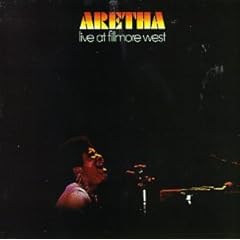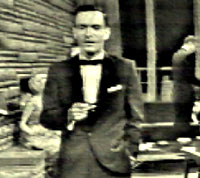
 The original album release contained an extremely edited version of the tune. Jerry Wexler cut the 25 something minutes back to just a few, and added horns and backing vocals. But here is the full 'raw' version.
The original album release contained an extremely edited version of the tune. Jerry Wexler cut the 25 something minutes back to just a few, and added horns and backing vocals. But here is the full 'raw' version.You can watch the integral (in house) video of the event below.
The album was taped at the Fillmore West in San Francisco, on March 5, 6 and 7, 1971. Ray appeared on the last night.
Line-up: King Curtis’s the Kingpins - with Jerry Jemmott on bass, Bernard Purdie on drums, Cornell Dupree on guitar, Truman Thomas on electric piano, Pancho Morales on congas, plus the Memphis Horns, backing vocals by The Sweethearts Of Soul (Brenda Bryant, Margaret Branch, Pat Smith). Special guest Billy Preston backed Aretha (and Ray!) on organ. (The horn parts and some of the backing vocals by the Sweethearts Of Soul were dubbed over in the studio).
Original release: Aretha Franklin, Live At The Fillmore West (Atlantic, SD 7205). The elpee had a 5-week #1 run on the Billboard R&B album chart.
Contents from the three concerts were re-released several times, in several formats. The most memorable one is Rhino Handmade's 4-CD set, titled Don't Fight The Feeling: The Complete Aretha Franklin & King Curtis Live At Fillmore West (May 3, 2005; ASIN: B0006SSOH2).
And don't forget to read this excellent, thoughtful piece by Jeff Meshel.
Soundclip (original album cut):
Wolfgang's Vault* has the full unabridged version of Ray's guest performance, one of the Greatest Moments in pop history. Watch Ray stepping on stage to act out a smoking improv on Spirit In The Dark.
* More recently, WV has also published audio-only versions of Aretha's concerts.
Wexler's cut (soundclip):
The B/W footage comes from a "Fillmore in house video". On 12 June 1987 the BBC aired a new episode of the Omnibus series, Aretha Franklin - Queen Of Soul. From 42:57 to 45:45 the documentary had a few bits from this footage."Aretha brings Ray Charles onto stage & they sing Spirit in the Dark". Source here.
In a 1971 interview Ray declared,
"That live recording by Aretha Franklin that I joined in on recently? It was a true accident. I just happened to be in a club in San Francisco, and somebody said to me: 'Hey, Ray, Aretha's working at Basin Street West' or wherever it was, and I said: 'I didn't know that. So why don't we go by and catch her?' So we all went by, and I was sitting out there. Evidently somebody told her, and before I knew it she'd left the stage and come up and snatched me. I mean, I can't argue with a woman - it's very difficult for me! She said: 'Come on up and do something'. but I didn't know what to do. I'm sure, if you listen to the song we did, the Spirit In The Dark, you could tell I don't even know the thing. I'd heard her sing it, but I think when Aretha sings something, after that everybody else should forget about it. You know nothing else can be done to it. So I didn't know it, but I figured: okay, since I'm here we might as well fake it the best we can. And the thing wound up selling over a million records."
| The second photo has also been associated with the Winterland Ballroom gig in February '71, and has been attributed to Robert Altman. |





























